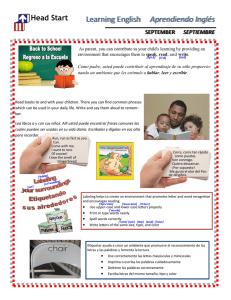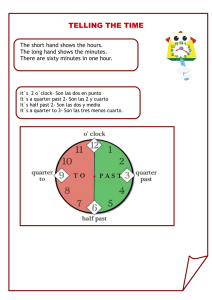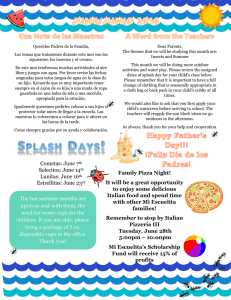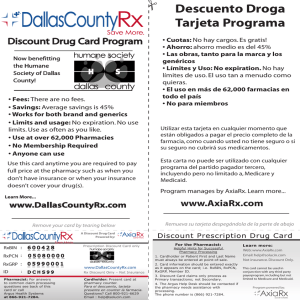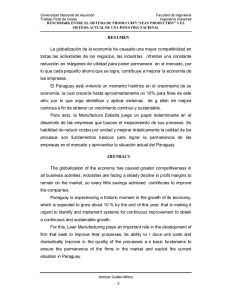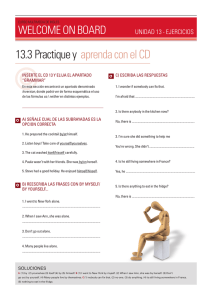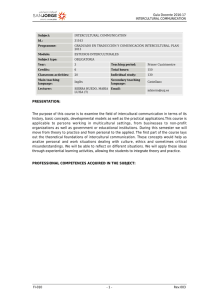This course is directly related to Pharmacy. Its aim is to
Anuncio
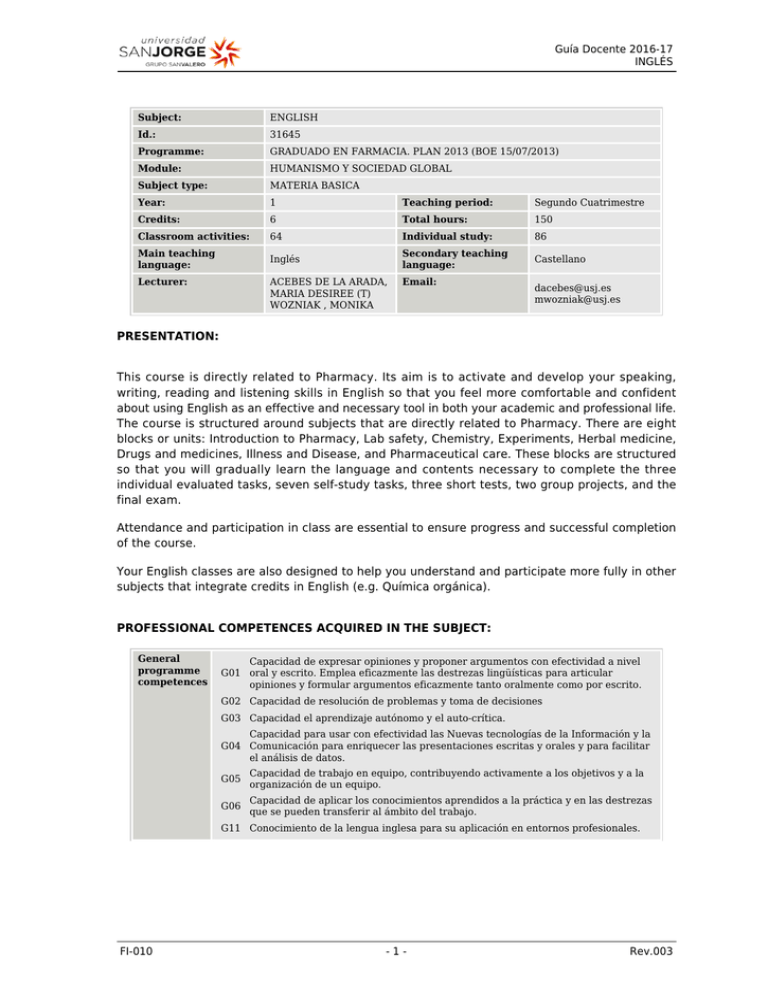
Guía Docente 2016-17 INGLÉS Subject: ENGLISH Id.: 31645 Programme: GRADUADO EN FARMACIA. PLAN 2013 (BOE 15/07/2013) Module: HUMANISMO Y SOCIEDAD GLOBAL Subject type: MATERIA BASICA Year: 1 Teaching period: Segundo Cuatrimestre Credits: 6 Total hours: 150 Classroom activities: 64 Individual study: 86 Main teaching language: Inglés Secondary teaching language: Castellano Lecturer: ACEBES DE LA ARADA, MARIA DESIREE (T) WOZNIAK , MONIKA Email: [email protected] [email protected] PRESENTATION: This course is directly related to Pharmacy. Its aim is to activate and develop your speaking, writing, reading and listening skills in English so that you feel more comfortable and confident about using English as an effective and necessary tool in both your academic and professional life. The course is structured around subjects that are directly related to Pharmacy. There are eight blocks or units: Introduction to Pharmacy, Lab safety, Chemistry, Experiments, Herbal medicine, Drugs and medicines, Illness and Disease, and Pharmaceutical care. These blocks are structured so that you will gradually learn the language and contents necessary to complete the three individual evaluated tasks, seven self-study tasks, three short tests, two group projects, and the final exam. Attendance and participation in class are essential to ensure progress and successful completion of the course. Your English classes are also designed to help you understand and participate more fully in other subjects that integrate credits in English (e.g. Química orgánica). PROFESSIONAL COMPETENCES ACQUIRED IN THE SUBJECT: General programme competences Capacidad de expresar opiniones y proponer argumentos con efectividad a nivel G01 oral y escrito. Emplea eficazmente las destrezas lingüísticas para articular opiniones y formular argumentos eficazmente tanto oralmente como por escrito. G02 Capacidad de resolución de problemas y toma de decisiones G03 Capacidad el aprendizaje autónomo y el auto-crítica. Capacidad para usar con efectividad las Nuevas tecnologías de la Información y la G04 Comunicación para enriquecer las presentaciones escritas y orales y para facilitar el análisis de datos. G05 Capacidad de trabajo en equipo, contribuyendo activamente a los objetivos y a la organización de un equipo. G06 Capacidad de aplicar los conocimientos aprendidos a la práctica y en las destrezas que se pueden transferir al ámbito del trabajo. G11 Conocimiento de la lengua inglesa para su aplicación en entornos profesionales. FI-010 -1- Rev.003 Guía Docente 2016-17 INGLÉS Specific programme competences Regulated profession competences Conocer las técnicas de comunicación oral y escrita adquiriendo habilidades que permitan informar a los usuarios de los establecimientos farmacéuticos en E58 términos inteligibles y adecuados a los diversos niveles culturales y entornos sociales. P03 Saber aplicar el método científico y adquirir habilidades en el manejo de la legislación, fuentes de información, bibliografía, elaboración de protocolos y demás aspectos que se consideran necesarios para el diseño y evaluación crítica de ensayos preclínicos y clínicos. Desarrollar habilidades de comunicación e información, tanto orales como escritas, para tratar con pacientes y usuarios del centro donde desempeñe su actividad P13 profesional. Promover las capacidades de trabajo y colaboración en equipos multidisciplinares y las relacionadas con otros profesionales sanitarios. Reconocer las propias limitaciones y la necesidad de mantener y actualizar la P15 competencia profesional, prestando especial importancia al autoaprendizaje de nuevos conocimientos basándose en la evidencia científica disponible. Learning outcomes Entender las ideas principales del discurso relacionado con el campo de la R01 Farmacia, la salud y su estudio, siempre que sea expresado de forma clara y sencilla. (Comprensión auditiva) R02 Identificar y entender las ideas principales de textos académicos y divulgativos relacionados con la Farmacia y la salud (comprensión lectora) R03 Participar en conversaciones sencillas relacionadas con temas personales, profesionales y académicos. (Interacción oral) R04 Enlazar frases de forma sencilla para describir, explicar procesos y proyectos, opinar y dar instrucciones (expresión oral) R05 Redactar textos estructurados relacionados con la Farmacia y la salud. Tomar apuntes de fuentes originales (expresión escrita). R06 Demostrar conocimientos de la terminología básica del campo de la farmacia. R07 Utilizar estrategias de la pronunciación para facilitar la pronunciación de términos farmacéuticos desconocidos. R08 Aplicar las destrezas de la comunicación oral en la presentación oral de trabajos. PRE-REQUISITES: It is highly recommended that you have at least a B1 level of English at the beginning of the course in order to be able to take full advantage of the course, but even if you now have a higher level the course will give you many opportunities to extend your vocabulary, your knowledge of pharmacy and improve all of your language skills in areas that you have not studied previously. If you find it difficult to follow classes or do the English assignments you should ask your teacher for help in tutorial sessions and/or sign up for one of the General English courses offered by the IML (Institute of Modern Languages). Your English teacher can advise and inform you about levels and timetables. SUBJECT PROGRAMME: Subject contents: 1 - Introduction to Pharmacy 1.1 - Pharmaceutical symbols 1.2 - Pharmaceutical industry 2 - Lab safety 2.1 - Lab equipment I FI-010 -2- Rev.003 Guía Docente 2016-17 INGLÉS 2.2 - Lab equipment II 2.3 - Protective clothing and lab symbols 3 - Chemistry 3.1 - Periodic table 3.2 - Comparing the elements 3.3 - Chemical formulas 4 - Experiments 4.1 - States of matter 4.2 - Instructions and description 4.3 - Cause and effect 4.4 - Scales of likelihood 4.5 - Experiments V 4.6 - Experiments VI 5 - Herbal medicine 5.1 - Herbal medicine I 6 - Drugs and medicines 6.1 - Types of medication 6.2 - Dosage 6.3 - Body parts 6.4 - Route of administration 6.5 - Side effects 7 - Illness and Disease 7.1 - Symptoms 7.2 - Ache and pain 7.3 - Illness and disease 7.4 - Viruses and bacteria 7.5 - Vaccination 8 - Pharmaceutical care 8.1 - Pharmaceutical care I 8.2 - Pharmaceutical care II 8.3 - Pharmaceutical care III 8.4 - Pharmacy documentation Subject planning could be modified due unforeseen circumstances (group performance, availability of resources, changes to academic calendar etc.) and should not, therefore, be considered to be definitive. TEACHING AND LEARNING METHODOLOGIES AND ACTIVITIES: Teaching and learning methodologies and activities applied: Classes are conducted exclusively in English and are practical. Students are expected to participate actively in class and in all class-related activities in English and practice it with communicative learning activities. Although this may be difficult at the beginning of the course, your linguistic competences will improve rapidly. Many class activities will be conducted in pairs and groups in the format of information gaps, debates, project preparation, problem solving, simulations, presentations etc. This methodology enables maximum student participation and talking time in class. It also encourages cooperative learning and meaningful interaction between FI-010 -3- Rev.003 Guía Docente 2016-17 INGLÉS students, and the development of professional competences. Tutorials: Please ask your teacher for a tutorial (in class or by email) if you need to ask questions, clarify concepts, practice a presentation or ask for any other kind of academic help with your English. Your teacher will inform you about tutorial times. Homework/tasks: You are expected to prepare daily for class, reading and studying the corresponding assignment on the PDU. You will be responsible for checking the syllabus on the PDU to know by when activities need to be completed. The teacher will check that you have completed the exercises and she will correct them. Academic expectations: Academic dishonesty will not be tolerated and will automatically result in failure (no second chances given!). Dishonesty and/or plagiarism includes, for example: using another person’s ideas without referencing appropriately; inventing a bibliographical reference or pretending to have consulted one; inventing research results without having done the research, etc. This inappropriate behaviour will be considered especially in relation to texts copied from the Internet and using automatic translation devices (machine translation is easily identifiable). ALL work must be your own work, without the help of others. Assignments: All assignments must be typed or word-processed. Double space your assignments and use Times New Roman size 12 and turned in on time. Late or handwritten work will not be accepted. All files must include the student’s full name followed by an underscore and the title of the task. For example: James Smith_Audiovisual Translation Task 1.doc Student work load: Teaching mode Teaching methods Estimated hours Classroom activities Master classes 5 Other theory activities 2 Practical exercises 4 Practical work, exercises, problem-solving etc. 16 Debates 4 Coursework presentations 10 Films, videos, documentaries etc. 7 Other practical activities 6 Assessment activities 8 Extra-curricular activities (visits, conferences, etc.) 2 FI-010 -4- Rev.003 Guía Docente 2016-17 INGLÉS Individual study Tutorials 5 Individual study 20 Individual coursework preparation 18 Group cousework preparation 8 Project work 8 Research work 10 Compulsory reading 5 Recommended reading 4 Other individual study activities 8 Total hours: 150 ASSESSMENT SCHEME: Calculation of final mark: Written tests: Individual coursework: Group coursework: Final exam: Tareas de auto-estudio: TOTAL 25 % 25 % 15 % 30 % 5% 100 % *Las observaciones específicas sobre el sistema de evaluación serán comunicadas por escrito a los alumnos al inicio de la materia. BIBLIOGRAPHY AND DOCUMENTATION: Basic bibliography: All course materials will be uploaded on the PDU. Recommended bibliography: ARMER, Tamzen. Cambridge English for Scientists. Cambridge: Cambridge University Press, 2011. DE GIULI, Ester; SALA, Angelo. English for Pharmacy. Milano:Hoepli, 2010. DÍAZ-GILBERT, Miriam. English for Pharmacy Writing and Oral Communication. Philadelphia: Lippincott Williams, 2009. DONOVAN, Peter. Basic English for Science. Oxford: Oxford University Press, 1978. KIERCZAK, Anna W. English for Pharmacists.Warsaw:Wydawnictwo Lekarskie PZWL, 2009. MOMPEÁN GONZÁLEZ, José A.;SERRA ALCARAZ, Francisco. English for health-care providers. Madrid: Arán Ediciones, 2013. Recommended websites: Cambridge Advanced Learner\'s Dictionary FI-010 http://dictionary.cambridge.org/dictionary/british/ -5- Rev.003 Guía Docente 2016-17 INGLÉS MedlinePlus http://www.nlm.nih.gov/medlineplus/medlineplus.html Oxford Advanced Learner\'s Dictionary http://oald8.oxfordlearnersdictionaries.com/ Physicians’ Desk Reference http://www.pdrhealth.com/ Visual Dictionary Online http://visual.merriam-webster.com/index.php * Guía Docente sujeta a modificaciones FI-010 -6- Rev.003
